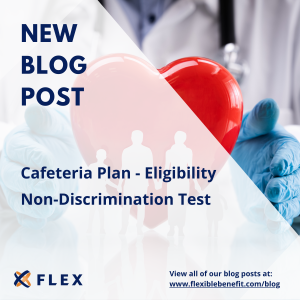Benefits Buzz
Cafeteria Plan - Eligibility Non-Discrimination Test

Cafeteria Plans, sometimes called Premium-only-Plans (POPs) or Section 125 Plans, allow employees to pay for health and welfare benefits with pre-tax contributions. Because contributions are tax-deductible, the Internal Revenue Service (IRS) has a set of rules in place to ensure highly compensated employees are not eligible for benefits more favorably than non-highly compensated employees. This is referred to as the Eligibility Non-Discrimination Test.
For Cafeteria Plan years starting in 2023, a highly compensated employee is defined as 1) an employee with compensation of $135,000 or more in 2022, 2) any employee who owns more than 5% of the company in the current or preceding year, 3) any employee who is an officer of the company, or 4) any spouse or dependent of the previously mentioned employees. It should be noted that many types of business owners (e.g., sole proprietors, partners in a partnership, more-than-2% owners of an S-Corp) are not eligible to participate in the Cafeteria Plan because they are considered self-employed, and they are treated differently for tax purposes.
To satisfy the Eligibility Non-Discrimination Test, employers should ensure the following requirements are met:
1) Highly compensated employees are not eligible for better benefits or larger contributions from the employer.
2) No eligible employee is required to complete more than three years of employment to participate in the Cafeteria Plan.
3) The same waiting period applies to all eligible employees.
4) Entry into the Cafeteria Plan is not delayed. Entry into the Cafeteria Plan must be no later than the first day of the first plan year after the waiting period has been satisfied.
5) If eligibility to participate in the Cafeteria Plan is only made available to a certain class of employees, the class must be reasonable and based on bona fide business criteria (e.g., full-time vs. part-time, salaried vs. non-salaried) and non-discriminatory. Usually, close to 100% if not exactly 100% of highly compensated employees are eligible to participate in the Cafeteria Plan. Employers will generally want to ensure that at least 50% of non-highly compensated employees are also eligible to participate in the Cafeteria Plan so eligibility for participation is not considered discriminatory. The eligibility percentage is lower for employers that have larger concentrations of non-highly compensated employees.
When any of the Eligibility Non-Discrimination Test requirements are failed, highly compensated employees lose the tax favorable treatment of the Cafeteria Plan. In other words, contributions made by highly compensated employees should be done on a post-tax basis. There is no consequence to non-highly compensated employees, and they can continue to make contributions with pre-tax dollars.
Cafeteria Plans also have two other Non-Discrimination Tests – the Contributions and Benefits Test and the Key Employee Concentration Test. Those tests are not addressed in this article but should not be overlooked.

